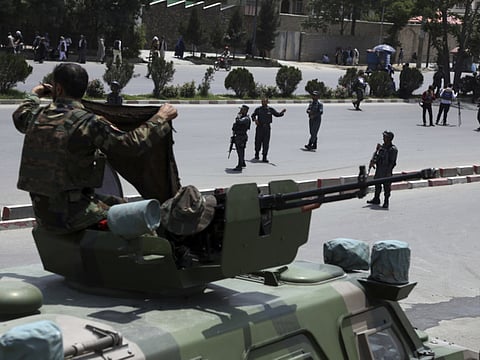It’s a zero-sum game in Afghanistan
In the face of a complete disconnect between the US-backed regime in Kabul and the people, peace will remain elusive

A report released last month by the US Special Inspector-General for Afghanistan Reconstruction confirms that the Afghan security forces, the cornerstone of America’s Afghan strategy, are unravelling as the Taliban-led resistance gains control of more Afghan territory. The security forces shrank by 10 per cent over the last year, according to the report. The US has spent more than $78 billion (Dh286.49 billion) trying to build the Afghan army and the police force since the US-led invasion of 2001.
Nearly a third of Afghan troops have deserted the forces annually, a trend witnessed over the last couple of years, jeopardising the ability of the country’s armed forces to perform at optimum levels. In seeking to build an institution of this nature, it is important to understand the nuances of the Afghan nation, which are based on tribal loyalties.
The soldiers, therefore, defer to the tribal warlords rather than to national institutions. Reports of corruption among the officer corps deprive the lower ranks of their dues, denting their motivation and thus resulting in the consequent desertions en masse. There is also tremendous peer pressure on those who join the national service, to desert and participate in the ‘freedom struggle’.
The report comes in the wake of two morning blasts that killed several people a day earlier outside the headquarters of the Afghan intelligence services. Following the formal launch of the Taliban Spring Offensive, these repeated attacks confirm Afghanistan’s inherently weak security structure.
The Taliban offensive, according to a statement, is also in response to US President Donald Trump’s new Afghan strategy, giving more authority to local US commanders to engage in combat operations against the resistance.While much of the US force remains holed up in its secure bases, more bombs are being dropped over Afghans than ever before, notwithstanding the fact that they have done little to dent the morale and the fighting ability of resistance fighters.
Disdaining peace overtures
President Ashraf Gani’s offer of unconditional talks to the Taliban made during the ‘Kabul Process’ — an Afghan-led group involving 20 states — was met with the usual disdain from the Taliban. Though regional players have welcomed the proposal, the Taliban believes that real power lies with the Americans and not the Kabul regime, which it believes to be only a puppet. As such, the Taliban insists on talking to the Americans only. The Americans, while publicly aiming for ‘political reconciliation’, still follow the strategy of peeling away and reintegrating Taliban elements in bits and piecesThe continuation of such a policy is unlikely to entice a steadfast resistance led by the Taliban..
The US can only advance the peace process by convincing the Taliban and others that the US eventually wants to pull out of Afghanistan and soon.
The Afghan war in the meantime remains at a stalemate. Amid this military standoff that has cost the US over $1 trillion so far, Trump lives in a state of strategic paralysis like his two predecessors. American objectives have moved from ousting the Taliban from Kabul to fighting extremism and then to rebuilding Afghanistan in America’s own image of democracy, which is unsuited to the tribal-based society that Afghanistan is. In the face of the complete disconnect between the US-installed regime in Kabul and the people of Afghanistan, such goals remain elusive.
Seeds of generational revenge
Military campaigns against Afghans and drone attacks in Pakistan’s tribal belt, which have killed thousands of civilians, have actually promoted extremist responses to what the tribal people consider American aggression. The principle of Nyaw aw Badal (justice and revenge), which requires one to seek justice or take revenge against a wrongdoer, is deeply ingrained in the Pashtunwali, the Pashtun code of life, and there is no time limit during which this revenge can be taken. Blood feuds last generations in Pashtun culture.
By killing mainly innocent civilians through its superior firepower, the US is planting seeds of generational revenge in Pashtun society. While blaming Pakistan for its own inability to quell the resistance, the US forgets that both sides of the border are inhibited by the people from the same tribes, who are believers of the Pashtunwali, and are only divided by a man-made line on a map.
The war in Afghanistan is essentially being fought at four levels. The US seeks to impose its own order in Kabul on the strength of its military might. The Taliban demand the ouster of both foreign forces and the US-installed regime in Kabul, allowing them to regain control of the whole country. Regional states such as Pakistan, Iran, Russia, China and India are jostling for space and influence. They all believe that US promotes chaos to justify its continued presence in the country. And lastly, America’s global campaign against ‘terrorism’ is fought on Afghan soil, which many believe is a cover-up for troop deployment, enabling the US to eavesdrop on Russia, China, Iran and Pakistan.
Durable peace needs a negotiated settlement on these levels. The Taliban hold the key within. Externally, unless Pakistan’s interests are adequately covered, no deal will hold. Since the time of Alexander, the Great, no invader has been able to hold Afghanistan. Isn’t it time for the US to learn from history?
Sajjad Ashraf served as an adjunct professor at the Lee Kuan Yew School of Public Policy at the National University of Singapore from 2009 — 2017. He was a member of the Pakistan Foreign Service from 1973-2008 and was Pakistan’s consul-general in Dubai during the mid-1990s.


